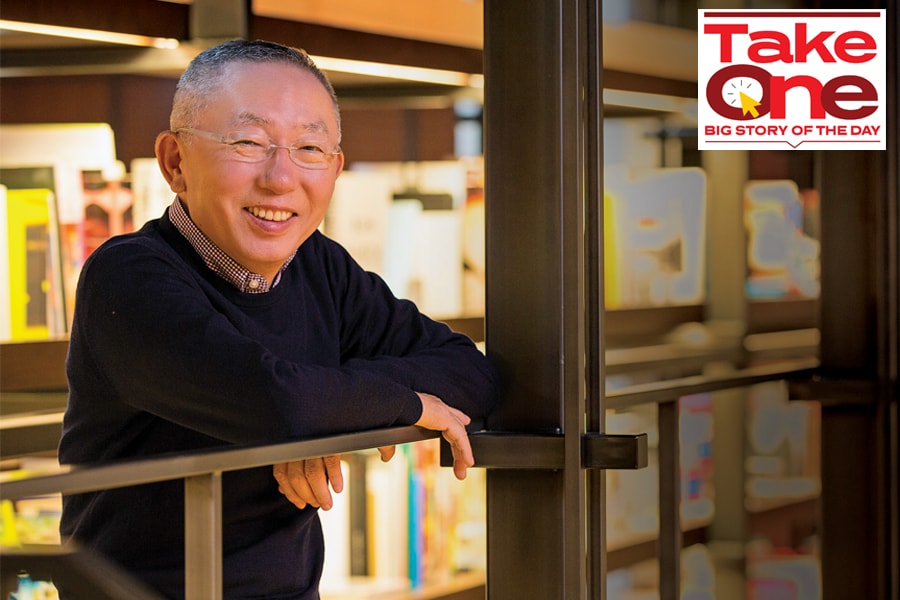 Tadashi Yanai, founder, Uniqlo.Overlooking the picturesque Sumida River, Fast Retailing’s headquarters in the Ariake district of Tokyo looks nothing like a traditional office. Built primarily for the company’s most popular brand, Uniqlo, the office features a 4.5-acre single-floor layout crafted to resemble a mini city. The workspace includes a winding interior street that spans the entire building, with meeting rooms, coffee shops, a large library, and diverse creative studios seamlessly integrated under one roof.
Tadashi Yanai, founder, Uniqlo.Overlooking the picturesque Sumida River, Fast Retailing’s headquarters in the Ariake district of Tokyo looks nothing like a traditional office. Built primarily for the company’s most popular brand, Uniqlo, the office features a 4.5-acre single-floor layout crafted to resemble a mini city. The workspace includes a winding interior street that spans the entire building, with meeting rooms, coffee shops, a large library, and diverse creative studios seamlessly integrated under one roof.
This ‘Ariake Project’ was a far-fetched dream for 23-year-old Tadashi Yanai.
Fifty-two years back, he took charge of his father’s clothing chain—Ogori Shoji—which had a handful of stores in Yamaguchi and Fukuoka Prefectures in southern Japan. When Yanai took over, he sought to make a dramatic change. From selling only men’s suits, he transitioned to casual everyday wear. In 1984, he opened a new store in Hiroshima, named Unique Clothing Warehouse, which he later shortened to Uniqlo.
At that time, he could not have anticipated that Fast Retailing—Uniqlo’s parent company—would boast of nearly ¥3 trillion ($20 billion) in annual sales in FY23 and that Yanai, now 75 years old, would be Japan’s richest man with a net worth of $38 billion as of May, according to Forbes.
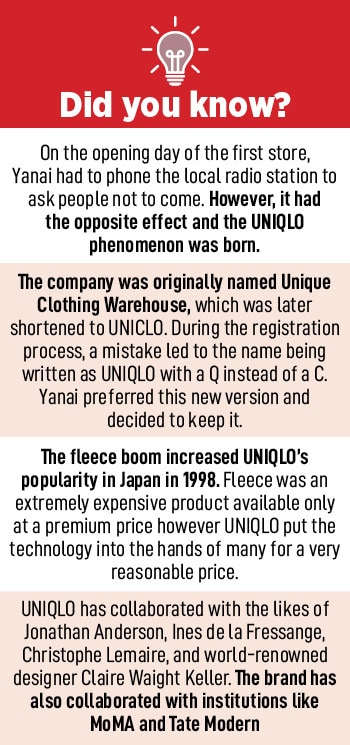 At 23, when Yanai was running his father’s tailoring shop, he handled every task—from lifting the store’s shutter and tidying up the space to assisting customers, managing sales, counting the cash and locking up at night.
At 23, when Yanai was running his father’s tailoring shop, he handled every task—from lifting the store’s shutter and tidying up the space to assisting customers, managing sales, counting the cash and locking up at night.
Even today, “he has the same spirit that he used to when he started the business in 1984”, says Yukihiro Katsuta, head of global research and development, Uniqlo; group senior executive officer, Fast Retailing. “If I were in his place, I think the money might have changed me. But Yanai has not changed at all. I’m not sure how many people can do that,” says Katsuta, who has been working with Yanai for 19 years.
Before achieving worldwide glory, Uniqlo had seen a series of lows. In 2001, after seeing the success in Japan, Uniqlo opened its first international store in London. “I love London,” says Yanai. “So we aimed to open 50 stores over three years. That was a terrible mistake. It failed miserably.”
By 2004, Uniqlo had to close most of its stores in London, and it encountered a similar challenge in Shanghai, China Yanai remained resolute though. “When I try something new, I know that I’m going to fail. I do not plan for success from the very first step. So I don’t take these failures too seriously, I just take on the challenge,” Yanai tells Forbes India during a meeting at the Ariake headquarters in Tokyo. “If you succeed the first time, there’s no learning. But if you fail, you think: Why did I fail? So, although failures are not fun, you learn from those.” It was this failure in the international market that taught Yanai an important lesson—the need to differentiate.

The second wave of store openings in Europe, with flagship stores launching in London and Paris in 2007, marked a crucial turning point for the brand. What worked this time around? “The concept ‘global is local, local is global’ is central for our business—balancing global and local considerations. In each market that we operate in, we work with our global headquarters to develop products that can satisfy local needs as well as be sold on a global scale,” says Yanai.
He adds that in doing business internationally, three basic questions need to be addressed. “First, who are you and what differentiates you? Second, what have you done so far for the world? Third, what can you contribute to the country you are working in? Asking these questions will help you understand and you will be able to communicate who you are, what you have done and what you want to achieve,” explains Yanai.
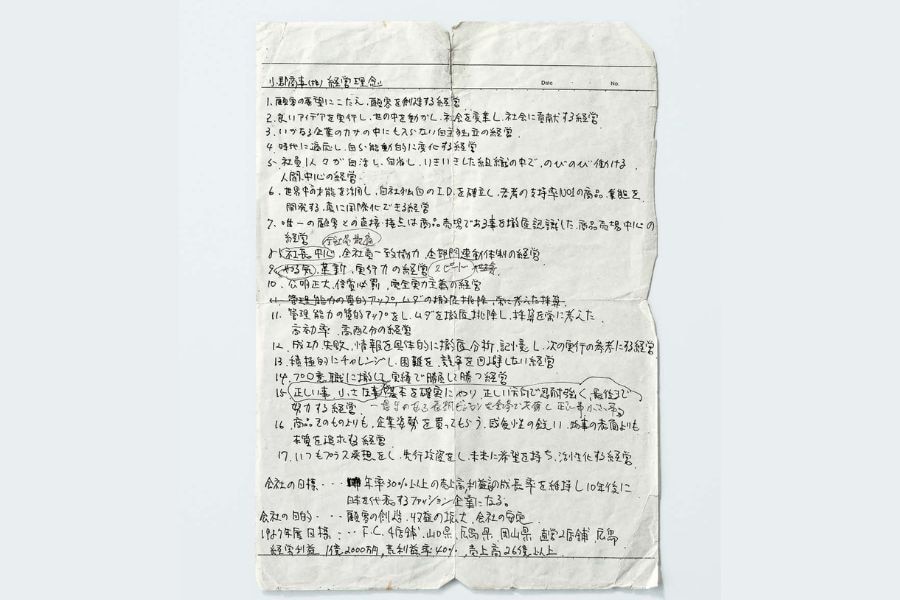 Tadashi Yanai created the Ogori Shoji Management Principles in 1979 and later wrote an updated volume called the 23 Principles of Management. While the basic management values remain the same, “president-centered business” (Principle 8) was later changed to “optimizing participation by all employees.” The family centered Ogori Shoji business developed into the employee-centered Fast Retailing.As of May, Uniqlo has 2,495 stores across the globe. It has more stores outside Japan than in Japan—1,697. ‘Stores exist to serve customers and thrive alongside employees’ is a quote prominently framed in his office. Yanai read this before launching Uniqlo, and it had a profound impact on him. “It perfectly encapsulates the principles of commerce. The purpose of management is to increase customer number—fans of the store,” he writes in the company’s annual report.
Tadashi Yanai created the Ogori Shoji Management Principles in 1979 and later wrote an updated volume called the 23 Principles of Management. While the basic management values remain the same, “president-centered business” (Principle 8) was later changed to “optimizing participation by all employees.” The family centered Ogori Shoji business developed into the employee-centered Fast Retailing.As of May, Uniqlo has 2,495 stores across the globe. It has more stores outside Japan than in Japan—1,697. ‘Stores exist to serve customers and thrive alongside employees’ is a quote prominently framed in his office. Yanai read this before launching Uniqlo, and it had a profound impact on him. “It perfectly encapsulates the principles of commerce. The purpose of management is to increase customer number—fans of the store,” he writes in the company’s annual report.
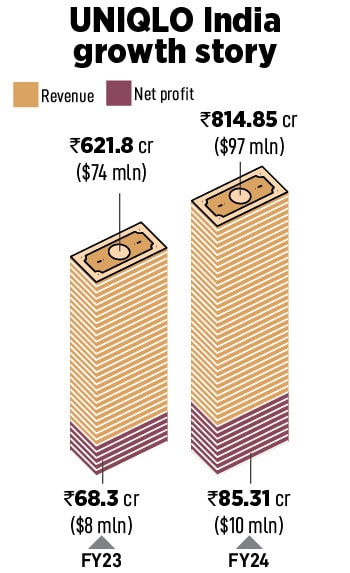 Five years of Uniqlo India
Five years of Uniqlo India
Uniqlo entered the Indian market relatively late, opening its first store in New Delhi in 2019. “We aim to become the number one apparel brand in India,” says Yanai.
Currently, Uniqlo has 13 brick-and-mortar stores in India that includes eight in Delhi-NCR, two in Mumbai, and one each in Chandigarh, Zirakpur (the first highway store) and Lucknow. For ecommerce, the brand is delivering to 17,000 pin codes in India. “Our strategy in India strategy has been threefold—one, to expand our store network; two, to grow our production base, and three, to provide opportunities to help local talent grow,” says former Uniqlo India CEO Tomohiko Sei.
“We continue to see excellent market opportunities in India, given the fact that Indian people have shown a strong preference for functional and high-quality products, which are an essential part of our brand,” he says, adding that the LifeWear concept has been particularly well received by customers in India.

In FY24, the company reported a 31 percent rise in turnover, with operating revenue increasing from Rs621.8 crore in FY23 to Rs814.85 crore in FY24. Net profit saw a 25 percent increase—from Rs68.3 crore in FY23 to Rs85.31 crore in FY24.
Customer-centric Approach
Katsuta says most of Yanai’s ideas over the past 40 years have come from a simple question of how he can make customers happy, which, by extension, became core to Uniqlo’s supply chain.
This is why Fast Retailing’s brands have customer care centres in-house. Using technologies like artificial intelligence (AI), customer centres analyse huge volumes of feedback—these help improve existing products and innovate for new ones. “We prefer speaking to customers directly. It helps us get better insights, and is faster in terms of execution,” explains Katsuta.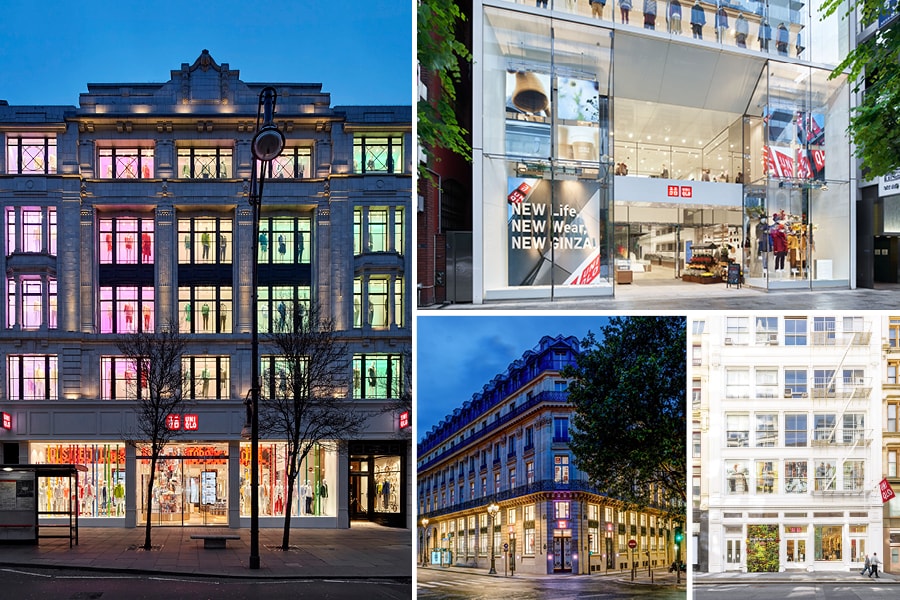 From L to R: UNIQLO- UK Oxford Street Global Flagship store 1; UNIQLO – Japan Ginza Global Flagship store 1; UNIQLO- France Paris Global Flagship store 1; and UNIQLO- USA Soho New York store Global Flagship store 1.One example of taking customer feedback seriously is the Souffle Yarn collection. “For close to 10 years, every winter we would get customer complaints stating that their sweaters are itchy, even if it was a fabric as good as cashmere,” says Katsuta, referring to how they thought of creating a yarn from scratch that doesn’t itch. After two years of research and development, Uniqlo launched its Souffle Yarn collection in 2019. “If customers demand a change, and we cannot deliver, we’ll be done.” In FY23, all of Fast Retailing’s brands saw 36.9 million opinions coming from around the world.
From L to R: UNIQLO- UK Oxford Street Global Flagship store 1; UNIQLO – Japan Ginza Global Flagship store 1; UNIQLO- France Paris Global Flagship store 1; and UNIQLO- USA Soho New York store Global Flagship store 1.One example of taking customer feedback seriously is the Souffle Yarn collection. “For close to 10 years, every winter we would get customer complaints stating that their sweaters are itchy, even if it was a fabric as good as cashmere,” says Katsuta, referring to how they thought of creating a yarn from scratch that doesn’t itch. After two years of research and development, Uniqlo launched its Souffle Yarn collection in 2019. “If customers demand a change, and we cannot deliver, we’ll be done.” In FY23, all of Fast Retailing’s brands saw 36.9 million opinions coming from around the world.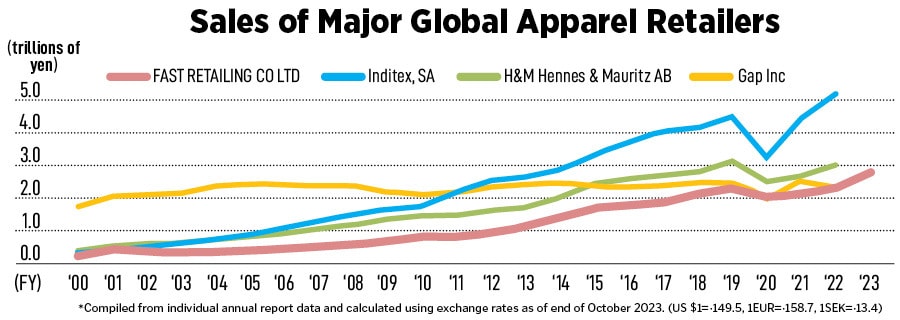
Quality first
The Japanese consistently prioritise quality, regardless of price. “Most in the apparel industry believe that fashion is synonymous with trend. They feel that chasing trends is the name of the game,” reckons Yanai, adding that clothing is much more than that.
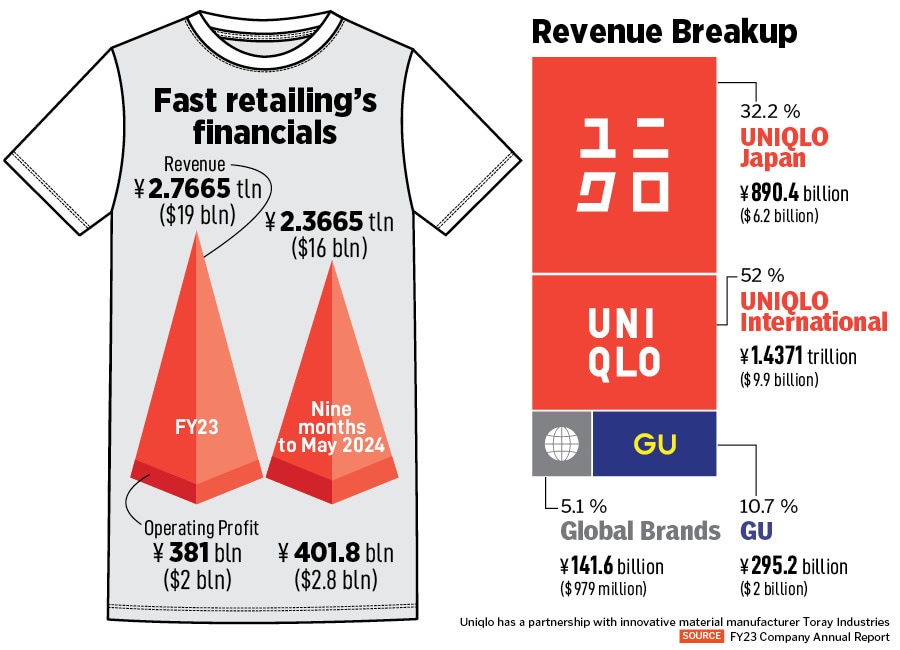 “In Japan, we believe in three fundamentals: Clothing, shelter and food. Hence, we strongly believe in LifeWear. These clothes might not be trendy, but clothing that gives you confidence and comfort. We need to value this, and the industry is not thinking about these things.”
“In Japan, we believe in three fundamentals: Clothing, shelter and food. Hence, we strongly believe in LifeWear. These clothes might not be trendy, but clothing that gives you confidence and comfort. We need to value this, and the industry is not thinking about these things.”
Katsuta agrees, “I don’t like the word ‘trend’. At Uniqlo, we love the idea of individuality—we want to make clothes with designs that people can make their own.” This ‘Made for All’ concept is why none of Uniqlo’s clothing has its logo up front.
There is a perception, however, that Uniqlo’s products are not as affordable as they were five years ago, especially in a market where rivals continue to keep lower prices. Yanai agrees that there have been some price increases, but these “are mainly driven by rising raw material costs, and are part of an industry-wide trend”. “For the past two years in India, we have worked to stabilise prices, and believe that customers appreciate the balance of quality and price.”
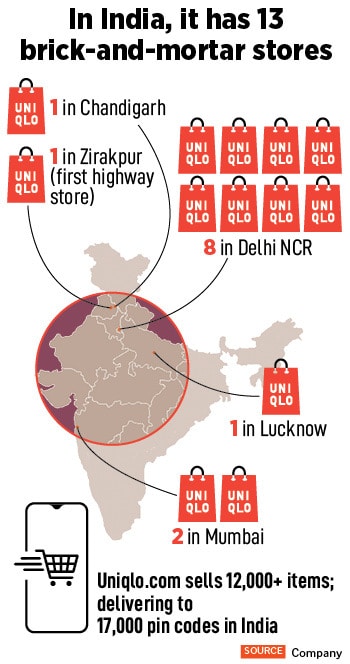 The Innovation Push
The Innovation Push
The general perspective is that the textile industry is old and obsolete. Yanai disagrees because the shifting zeitgeist is influencing both lifestyle and clothing choices. “I wanted to create clothes and fabrics that had new value. This is where science and technology make a difference,” he says. With this in mind, Uniqlo established a strategic partnership with the innovative material manufacturer Toray Industries in 2006. The 2,464.6 billion yen-Toray was established in 1926, and works across sectors, from apparel and carbon fibre composite materials to pharmaceuticals and medical devices.
In a small town called Otsu, about 20 km from Kyoto, is Toray’s Advanced Textiles Development Center. It is also the birthplace of some of Uniqlo’s signature technologies such as HEATTECH, AIRism and Ultra-Light Down. Toray’s development centre looks at R&D for all stages: From weaving and spinning of the yarn to dyeing and finishing. The team employs evaluation tools in its weather simulation lab, including a virtual space treadmill and a motion analysis system, to test the final products. Toray then works with Uniqlo’s partners across the globe to implement these technologies.
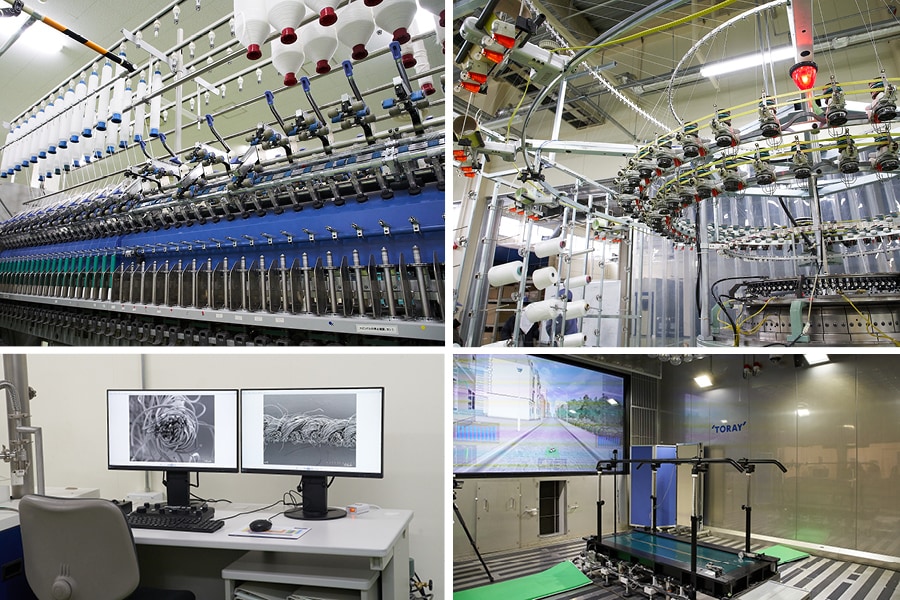 From L to R (Top): Toray_tour181; Toray_tour226. (Bottom): Toray_tour295; Toray_tour326. “We attend to the smallest details, get directly involved in the production process for every garment, and make clothes with long-term and deeply trusted partner factories,” explains Yanai. For this, Uniqlo uses the latest technologies to innovate, evolve and improve the clothes. Which is why Yanai often says, “Uniqlo is not a fashion company; it’s a technology company.”
From L to R (Top): Toray_tour181; Toray_tour226. (Bottom): Toray_tour295; Toray_tour326. “We attend to the smallest details, get directly involved in the production process for every garment, and make clothes with long-term and deeply trusted partner factories,” explains Yanai. For this, Uniqlo uses the latest technologies to innovate, evolve and improve the clothes. Which is why Yanai often says, “Uniqlo is not a fashion company; it’s a technology company.”
Sustainability is also a fundamental aspect of the business. “Doing business is to be helpful to people. If you do not have that philosophy, you will not succeed greatly. I want to grow my business for society,” Yanai says. To encourage consumers to wear clothes for longer, Re.Uniqlo Studios provides services to repair, reuse, remake or recycle clothes.
For instance, people can customise their worn-out clothes using traditional Japanese sashiko embroidery techniques. However, using sustainable materials without compromising quality remains a challenge. “There is a lot of innovation that needs to be done in this area,” explains Katsuta. There are no Re.Uniqlo Studios in India, and there is no visibility on them launching here.
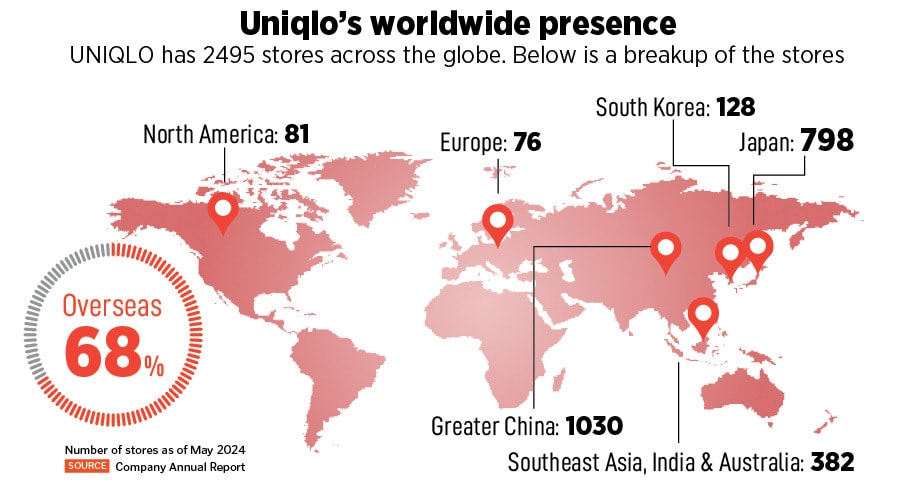
The Fourth Frontier
Yanai remains hands-on in the business. For example, he reviews the global customer feedback report daily and personally signs off on all collections before they are released.
His management style, however, has evolved over the last 40 years. “When we had 30 to 40 stores, this was a president-centric company. But not anymore,” he notes. Back in 1984, he noted down a list of management principles for the company. “It’s not possible for me to manage the day-to-day operations as I used to. Our employees need to think for themselves, and these principles help guide them,” remarks Yanai as he hands me what looks like a business card on which the 23 management principles are printed front and back. Employees of Fast Retailing carry this card along with their company ID. “Be it one store or 10,000 stores, the same good management practices need to be applied,” Yanai says.
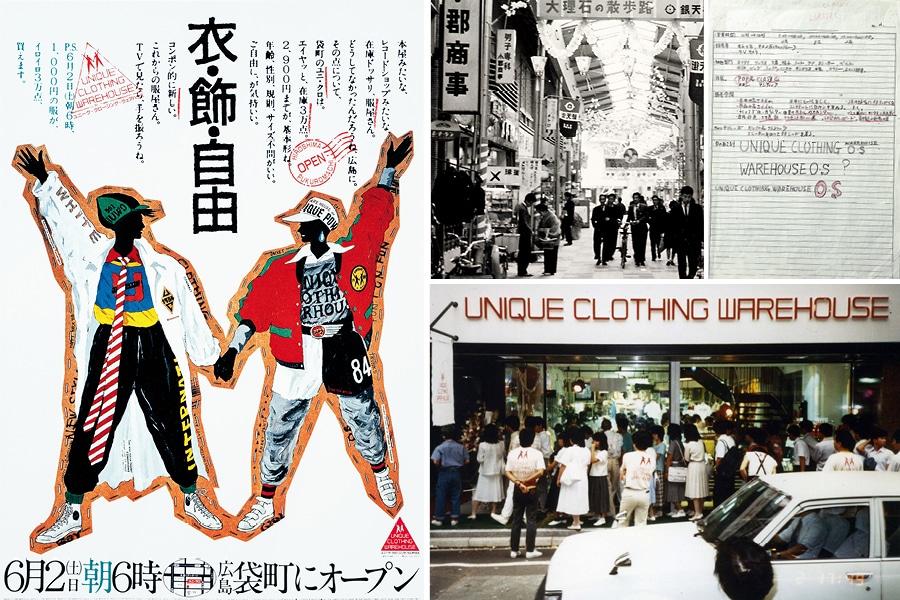 From L to R: (1984) Poster for first-ever UNIQLO store in Fukuromachi, Hiroshima; First UNIQLO Store in Japan.As the brand completes 40 years, Yanai has announced his next big vision—“The Fourth Frontier: Challenge, Take Action, Achieve.” This illustrates the changes that Uniqlo will undergo in order to become a truly global brand. In the 2023 Integrated Annual Report, Yanai writes: ‘We will tackle the challenges of the future, driven by our mission: Changing clothes. Changing conventional wisdom. Change the world. Technology is advancing quickly and people’s clothing needs are evolving as well. We need to anticipate those needs… how clothing will evolve, innovate and produce those products,” says Yanai.
From L to R: (1984) Poster for first-ever UNIQLO store in Fukuromachi, Hiroshima; First UNIQLO Store in Japan.As the brand completes 40 years, Yanai has announced his next big vision—“The Fourth Frontier: Challenge, Take Action, Achieve.” This illustrates the changes that Uniqlo will undergo in order to become a truly global brand. In the 2023 Integrated Annual Report, Yanai writes: ‘We will tackle the challenges of the future, driven by our mission: Changing clothes. Changing conventional wisdom. Change the world. Technology is advancing quickly and people’s clothing needs are evolving as well. We need to anticipate those needs… how clothing will evolve, innovate and produce those products,” says Yanai.
The billionaire has set a target of achieving group revenue of ¥5 trillion within a few years, and then he says, “doubling that to ¥10 trillion is not an unrealistic goal”. India, he adds, will play a key role in reaching this target. “We may or may not be successful in impressing customers always. But the mindset should always be to impress customers,” he says.
(The writer was in Japan on invitation from Uniqlo)
